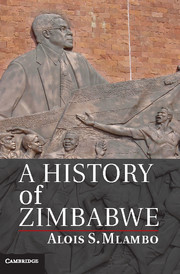Book contents
- Frontmatter
- Dedication
- Contents
- Figures
- Tables
- Maps
- Acknowledgements
- Timeline
- Notable Figures in Zimbabwean History
- 1 Introduction: Zimbabwe in Historical Perspective
- 2 Early States, c. 900–1900
- 3 The British Conquest State
- 4 Colonial Economy and Society to 1953
- 5 The Federation Years, 1953–1963
- 6 Nationalist Movements to 1965
- 7 Unilateral Declaration of Independence and African Response
- 8 Independent Zimbabwe, 1980–2000
- 9 The Crisis Years, 2000–2008
- 10 Conclusion: Zimbabwe Past, Present and Future Prospects
- Select Bibliography
- Index
- References
10 - Conclusion: Zimbabwe Past, Present and Future Prospects
Published online by Cambridge University Press: 05 June 2014
- Frontmatter
- Dedication
- Contents
- Figures
- Tables
- Maps
- Acknowledgements
- Timeline
- Notable Figures in Zimbabwean History
- 1 Introduction: Zimbabwe in Historical Perspective
- 2 Early States, c. 900–1900
- 3 The British Conquest State
- 4 Colonial Economy and Society to 1953
- 5 The Federation Years, 1953–1963
- 6 Nationalist Movements to 1965
- 7 Unilateral Declaration of Independence and African Response
- 8 Independent Zimbabwe, 1980–2000
- 9 The Crisis Years, 2000–2008
- 10 Conclusion: Zimbabwe Past, Present and Future Prospects
- Select Bibliography
- Index
- References
Summary
As shown throughout this book, the country that became Rhodesia in 1890 and Zimbabwe at independence in 1980 had a long history of indigenous civilisations before British colonisation. The coming of British colonialism spearheaded by Cecil John Rhodes and his British South Africa Company (BSAC) in 1890 transformed the country’s social, political and economic landscape and introduced Western systems of government and a modern economy. The two mainstays of the economy of the country, now renamed Southern Rhodesia, in the early years were mining and agriculture, but gradually secondary manufacturing took root and then rapidly expanded during and after the Second World War, partly as a result of import-substitution industrialisation strategies actively pursued by the colonial government and investors. In the meantime, the country became progressively industrialised as the African population moved into the emerging urban centres to work in the expanding secondary manufacturing sector. Economic growth continued in the Federation period from 1953 to 1963, but suffered a brief setback following the Rhodesian government’s UDI in 1965, which resulted in international economic sanctions in reprisal. Thereafter, the economy grew rapidly, again, because of import-substitution industrialisation strategies adopted by the beleaguered country, only to go into decline in the late 1970s owing to a combination of factors that included more effective implementation of sanctions and the intensification of the liberation war by African nationalist fighters.
White domination of the country caused much resentment among the African majority, especially in the very early years when they lost their independence and self-determination and became second-class citizens in their own land. Not surprisingly, most African communities across the country rose against colonial rule in the Chimurenga/Umvukela wars of 1896 and 1897, but were defeated. Thereafter Africans mobilised themselves, first in support or solidarity groups and, gradually, in political organisations and workers movements in the 1930s and after, until the flowering of militant mass African nationalism in the 1950s. From petitioning the white rulers for good governance in the interwar years, Africans now demanded the right to rule themselves under the principle of ‘one man one vote’ or ‘majority rule’. When the colonial authority, Britain, refused to grant independence to Southern Rhodesia under white minority rule, the white government under Rhodesian-born Ian Douglass Smith declared unilateral independence in 1965.
- Type
- Chapter
- Information
- A History of Zimbabwe , pp. 249 - 260Publisher: Cambridge University PressPrint publication year: 2014



